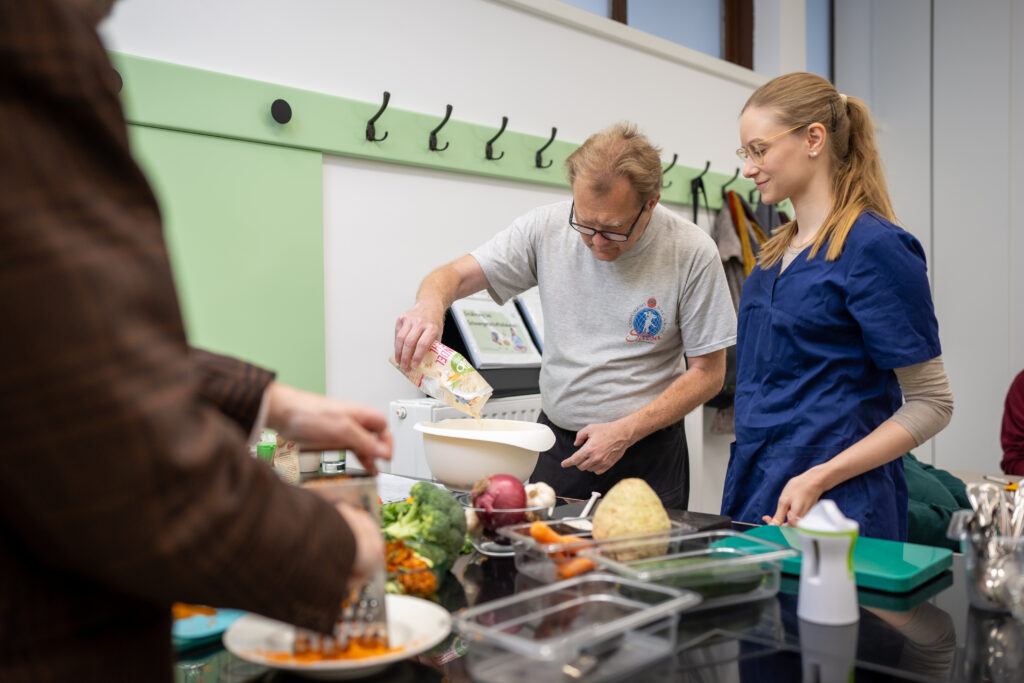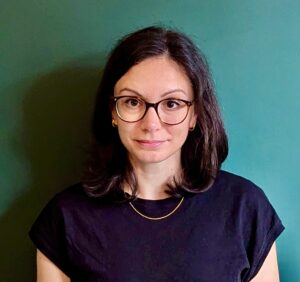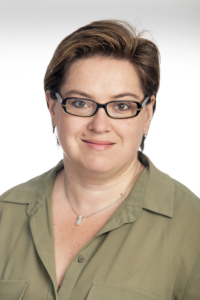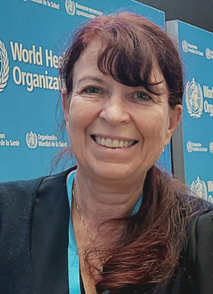Citizen participation in decision-making that relates to a country’s health system can help to improve it – as long as the process is genuine and the findings are taken seriously.
Text: Dietmar Schobel
The newly built Wienerberg Diabetes Centre – located in a municipality building on Sahulkastraße in Favoriten, Vienna’s 10th district – opened its doors to its first patients in March 2023. Here, a multidisciplinary team of internal medicine physicians, nurses, dietologists and psychologists are able to treat up to 8,000 patients per year and provide them with ongoing assistance in dealing with their condition as they go about their everyday lives. In addition to group courses and individual counselling on Type 1 and Type 2 diabetes and on diabetes during pregnancy in general, special three-hour courses are held in a new instructional kitchen. Patients with diabetes cook and eat together with the course tutors, who provide them with plenty of practical tips.

25 recommendations put into practice
Paving the way for the comprehensive range of services available at the diabetes centre was an equally comprehensive three-year participation process scientifically monitored by experts at the Austrian national public health institute, Gesundheit Österreich GmbH. Around 500 diabetics took part in this survey and specified what services they would like to be available. Additional discussion groups were held to determine the needs of people whose native language was not German. Based on the survey findings and their own personal experiences as patients, 20 people – with and without migrant backgrounds – came together in three workshops where a total of 35 recommendations were developed, to be taken on board when designing the Wienerberg Diabetes Centre. Of these, no fewer than 25 ended up being implemented.
Participation should be ongoing
Examples of this are the close cooperation between the diabetes centre and diabetes self-help groups, and that two registration desks – one of which is barrier-free – have been installed to keep waiting times to a minimum. As well as this, patients are continually invited to submit their own ideas online. After all, one of the recommendations made during the participation process was that patient involvement in the diabetes centre should take place on an ongoing basis.
This example from Austria shows how participation in the health system can take place in practice. The theoretical possibilities for this are highly diverse, ranging from shared decision-making for therapies to active participation in developing health laws. Participation can be possible in institutions, municipalities and regions, and also at national, European and global levels – and it comes in many different forms as well. These include online or offline questionnaires for determining the opinions and wishes of citizens, as well as focus groups, where these are conveyed in a moderated group discussion. Community mapping involves working together to present resources, problems and solutions visually. Forms of participation that allow citizens to play a more active role include workshops, round-table discussions and committee work.
Real participation and tokenism
The degree of public participation is always a central topic for discussion – and it is particularly important for the findings of participation processes to be ultimately taken seriously by decision-makers as well. The eight-rung Ladder of Citizen Participation put forward by US public policy analyst Sherry Arnstein back in 1969 is still seen as a fitting model for this. Only the top three rungs – Citizen Control, Delegated Power and Partnership – are regarded as real participation (“citizen power”) because it is here that citizens have an opportunity to exert a real influence. The middle three rungs – Placation, Consultation and Informing – are seen as “degrees of tokenism”, forms of citizen participation that are superficial and merely serve to involve citizens for the sake of appearance. The two lowest rungs – Therapy and Manipulation – are forms of non-participation. Sherry Arnstein saw the Therapy stage as involving the development of “pseudo-participatory programs that attempt to convince citizens that they are the problem when in fact it’s established institutions”.
In 2013, Kristin L. Carman and her co-authors published a research article called “A Multidimensional Framework For Patient And Family Engagement In Health And Health Care” in US health policy journal Health Affairs. This clearly structured concept shows three degrees of participation in the health system – from talking to patients about their involvement to partnership and shared leadership – as well as three different levels at which engagement can take place: Direct Care, Organisational Design & Governance and Policy-Making.
A survey at EU level

Eleanor Brooks from the University of Edinburgh has studied participation at European Union level in great depth. An expert in health policy, she is principal investigator for the EU project “Better Regulation for Better Health”. Among other things, this has involved conducting a survey on the experiences that non-governmental organisations (NGOs) from the health sector have had with participation at EU level in recent years.
As she explains: “For almost every legislative initiative, the European Commission is obliged to facilitate online input as part of what are known as Open Public Consultation processes, or OPCs.” Around 30 NGOs took part in this survey about the use of OPCs. One of the central findings is that NGOs feel that the opportunity to give digital feedback on planned legislation should be combined wherever possible with personal forms of participation such as interviews or meetings with decision-makers.
When it comes to in-person meetings, the “balance of power” needs to be more equal. Eleanor Brooks: “For example, we received feedback through our survey that there are often several people representing the interests of industry at consultations while there are only one or two representing those of NGOs.” The survey also shows that representatives of health NGOs at EU level would like:
* Participation processes to be more transparent and accessible
* Open formats facilitating free-text responses should be favoured over more restrictive formats, such as multiple-choice questions
* To be told how their suggestions have been taken into account.
Decisions receive broader support

If participation is taken seriously, it is always a complex undertaking that calls for time and money to be invested. However, what benefits does this have for policy-making and administrative representatives, and ultimately for society as a whole? Claudia Habl, health economist and department head at Gesundheit Österreich GmbH, says: “Patients, relatives, citizens in general and interest groups can contribute their own experience as experts in this area. As they have a different perspective than health professionals, they can put forward new solutions to problems, which in turn helps to bring about improvements in the health system. As well as this, decisions receive broader support if citizens have had a say in them. And is important to take on board as many different opinions as possible and to make sure that ‘quiet voices’ are also heard.”
Of course, in spite of all the benefits of participation, it is important to bear in mind that even civil society representatives can be “ineffective, corrupted, repressed, tamed or a puppet for somebody else”, as described in Civil Society and Health, a publication by European Observatory on Health Systems and Policies.
Mutual trust is the key

Vesna Kerstin Petrič, Head of the Office for Cooperation with WHO at the Slovenian Ministry of Health (see also separate interview), is working to ensure that participation by citizens – and especially those from vulnerable groups – will play a far greater role in the health systems of European countries in the future. In her view, this is the only way to have universal health coverage where no one is left behind.
As the Slovenian public health expert emphasises: “Trust is the key to achieving this. Decision-makers and health experts must trust that non-professionals are capable of making sound and forward-looking decisions on health issues. This can also mean that it is necessary to make the latest reliable knowledge on specific topics available in a form that everyone can readily understand. And conversely, citizens and representatives of NGOs must be able to trust in the integrity of decision-makers and health experts and also be prepared to cooperate.”
